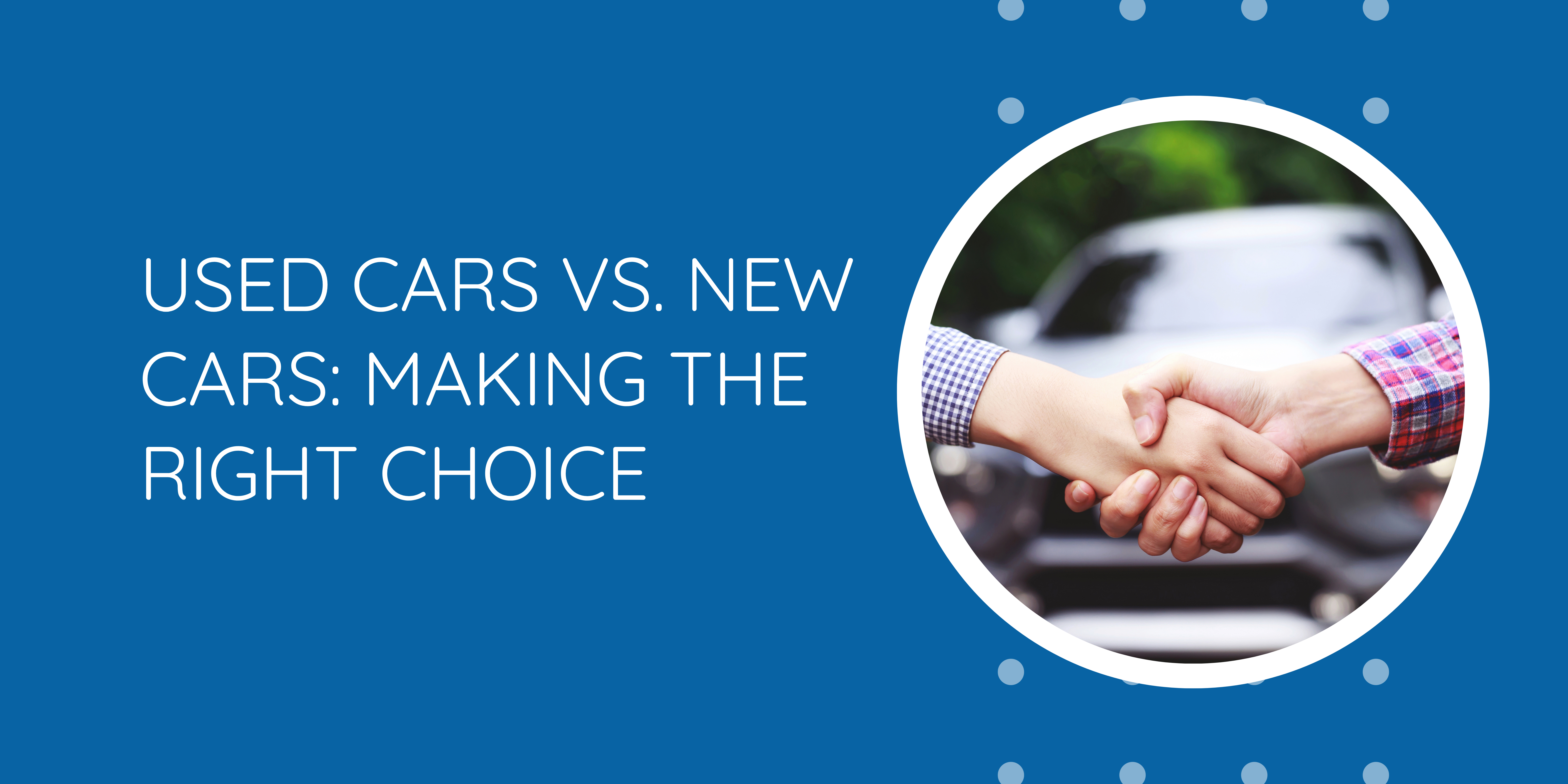Used Cars vs. New Cars
The decision to purchase a car is often accompanied by a crucial choice: should you opt for a brand new vehicle or consider a used one?
The Initial Cost
New Cars
The allure of a new car is undeniable. They come fresh from the factory, boasting the latest technology, unblemished interiors, and that unmistakable scent of newness.
However, this premium experience comes at a cost, and it's one of the first considerations for prospective buyers. Dealerships offer the latest models with all the bells and whistles, but these come at a premium price. The initial depreciation hits hardest in the first few years, making new cars more expensive from the get-go.
Used Cars
On the flip side, used cars offer significant savings on the initial purchase price. They have already gone through the steepest part of their depreciation curve, which means you can get a vehicle with relatively low mileage and excellent condition for a fraction of the cost of a new one. The affordability of used cars makes them an attractive choice for budget-conscious buyers. This means that you can drive a high-quality vehicle without breaking the bank.
When considering the initial cost, it's essential to evaluate your budget and financial goals. New cars, while appealing, may strain your finances with their higher price tags. Used cars, on the other hand, allow you to allocate your budget more efficiently, potentially freeing up funds for other essential expenses.
Depreciation
New Cars
The value of a new car begins to depreciate as soon as you drive it off the dealership lot. In the first year alone, it can lose up to 20% of its value. Over the next few years, this depreciation continues, often leveling off after the fifth year. This rapid loss of value is a significant consideration for those looking to maximize their investment. The moment you take ownership, your new car becomes a used car, and this transition can be financially significant.
Used Cars
Used cars have already experienced the most substantial depreciation hit. The rate of depreciation is slower compared to new cars, making them a more stable investment in terms of retaining their value. While they may not have that fresh-from-the-factory appeal, they offer a better long-term value proposition for savvy buyers. Choosing a used car means that you're letting someone else absorb the initial depreciation, and your vehicle retains its value more steadily.
Understanding depreciation is vital when assessing the long-term cost of vehicle ownership. New cars may provide a thrilling driving experience, but they also come with the certainty of significant value loss. Used cars, however, allow you to escape the steepest part of this depreciation curve, providing a more stable financial foundation.
Financing Options
New Cars
New car buyers often enjoy attractive financing options, including low-interest rates and manufacturer incentives. This can make owning a new car more affordable over the long term. While the initial cost may be higher, these financing perks can balance out the overall expenditure. Low-interest rates can result in lower monthly payments, which is a crucial consideration for those looking to manage their budget efficiently.
Used Cars
Financing a used car can be a bit trickier, as interest rates may be higher due to the perceived higher risk associated with older vehicles. However, the lower purchase price still often results in lower monthly payments compared to new cars. This can be a significant advantage for those working within a tight budget. Even though the interest rates may be slightly higher, the lower principal amount means that your monthly payments remain manageable.
When exploring financing options, it's essential to weigh the overall cost of ownership, including interest rates, against your budget. New cars may offer enticing low-interest rates, but the higher purchase price and faster depreciation can offset these advantages. Used cars may come with slightly higher interest rates, but their lower initial cost can lead to more budget-friendly monthly payments.
Insurance Costs
New Cars
New cars typically come with higher insurance premiums due to their higher value. Additionally, you may be required to carry comprehensive coverage if you have a loan on a new vehicle. The combination of a higher car value and more extensive coverage can result in increased insurance costs. While the new car itself may be more expensive to insure, the comprehensive coverage requirement adds another layer of cost.
Used Cars
Insurance costs for used cars are generally lower. With a less valuable asset, you may opt for basic coverage, which can save you money in the long run. This makes used cars a cost-effective choice for those looking to minimize monthly expenses. Lower insurance premiums contribute to the overall affordability of owning a used car.
When considering insurance, it's crucial to factor in the potential savings offered by used cars. While new cars often require comprehensive coverage due to their higher value, used cars may allow you to opt for more budget-friendly insurance options, reducing your monthly expenses.
Maintenance and Repairs
New Cars
New cars are covered by warranties that can last several years. This means that most of the repairs and maintenance costs are often taken care of by the manufacturer during this period. This warranty coverage provides peace of mind and can significantly reduce the long-term maintenance expenses associated with owning a car. With a new car, you're less likely to encounter unexpected repair bills in the early years of ownership.
Used Cars
Used cars may not have warranties, or if they do, they are often limited. Maintenance and repair costs can be higher for older vehicles, especially if you encounter unexpected issues. However, choosing a well-maintained used car and keeping up with regular maintenance can mitigate some of these costs. Investing in preventive maintenance can help keep repair bills manageable and ensure your used car remains reliable.
When it comes to maintenance and repairs, it's essential to consider the long-term picture. New cars offer the benefit of warranty coverage, reducing the likelihood of costly repairs during the early years of ownership. Used cars, while potentially requiring more maintenance, can still be cost-effective choices if you prioritize regular upkeep and choose a reliable vehicle.
Customisation and Features
New Cars
New cars offer the latest technology, safety features, and customization options. You can often choose the exact make, model, and color you desire. The extensive array of choices allows you to tailor the vehicle to your specific preferences. Whether you want the latest infotainment system or a specific paint color, new cars provide a wide range of options to satisfy your personal tastes.
Used Cars
Used cars may have limited options in terms of features and customization. However, you can still find a wide variety of models and trims that may suit your preferences. While you may not have the latest gadgets, you can often find a used car that fits your needs without breaking the bank. Used cars offer the advantage of affordability while still providing a decent level of customization options. While you may not get the latest high-tech features, you can often find a used vehicle that matches your essential requirements without the premium price tag.
When it comes to customisation and features, your choice may depend on your preferences and willingness to prioritize the latest technology. New cars offer the pinnacle of cutting-edge features, but this luxury often comes at a higher cost. Used cars may offer fewer options, but for many buyers, they provide a practical and budget-friendly alternative.
Environmental Considerations
New Cars
Newer cars often come with more fuel-efficient engines and lower emissions, which can be an important factor for environmentally conscious buyers. If reducing your carbon footprint is a priority, a new car with advanced green technology may be the way to go. New car manufacturers invest heavily in eco-friendly technologies, making new vehicles a good choice for those concerned about the environment.
Used Cars
While older cars may not be as environmentally friendly in terms of emissions, there's a different aspect of eco-friendliness to consider. Keeping used cars on the road longer through purchases and recycling can also have positive environmental impacts. By extending a vehicle's lifespan, you contribute to reducing the demand for new car production, which has its own environmental benefits. Choosing a used car can align with your eco-friendly values in a different way, by promoting sustainability through longer vehicle lifespans.
Environmental considerations are increasingly crucial in today's world. If you're concerned about reducing your carbon footprint, new cars with advanced fuel-efficient technology may be your preferred choice. However, for those who want to make a different kind of eco-friendly impact by reducing the demand for new car production, used cars offer a sustainable solution.
The choice between a new car and a used car is a complex decision influenced by multiple factors. New cars offer the allure of the latest technology and the pride of ownership but come at a premium cost, both initially and in terms of ongoing expenses. On the other hand, used cars provide affordability, slower depreciation, and budget-friendly insurance and maintenance costs. The choice ultimately depends on your individual circumstances, priorities, and budget.
Before making your decision, carefully evaluate your financial situation, preferences, and long-term goals. Ensure that your choice aligns with your lifestyle and meets your needs. Whether you opt for the thrill of a new car or the budget-consciousness of a used one, remember that the right choice is the one that suits you best.







